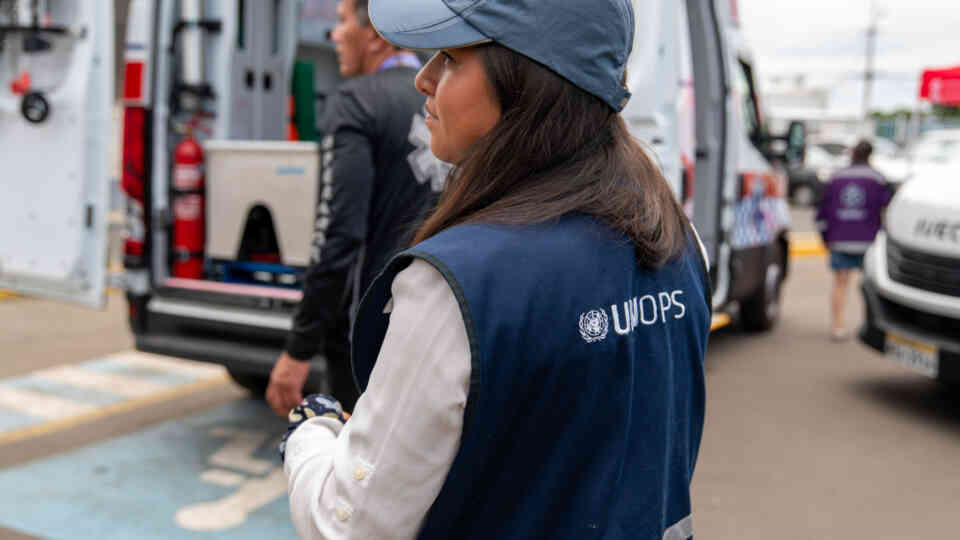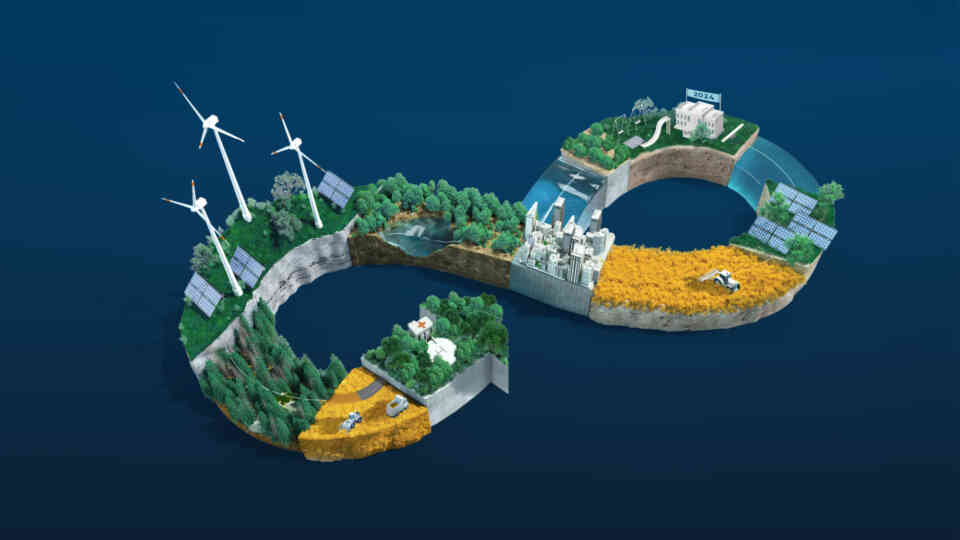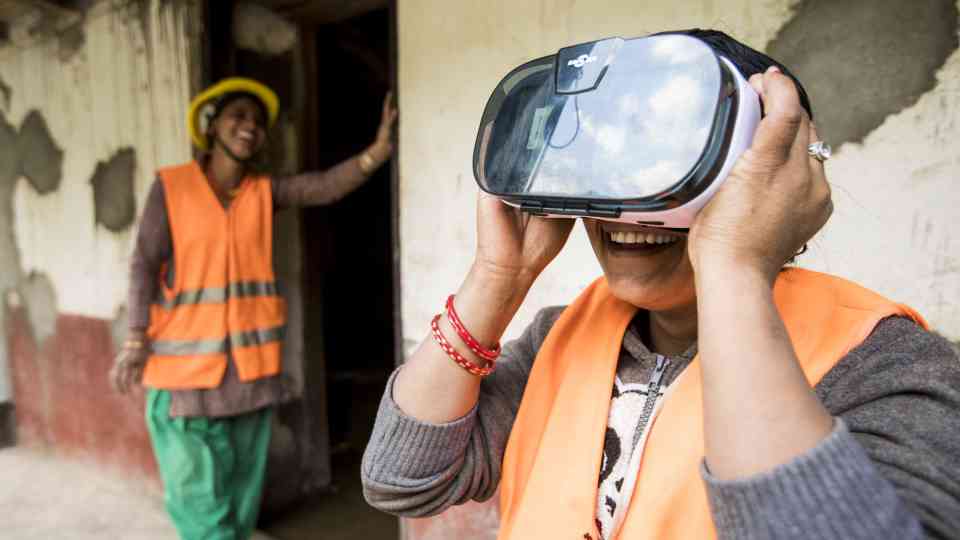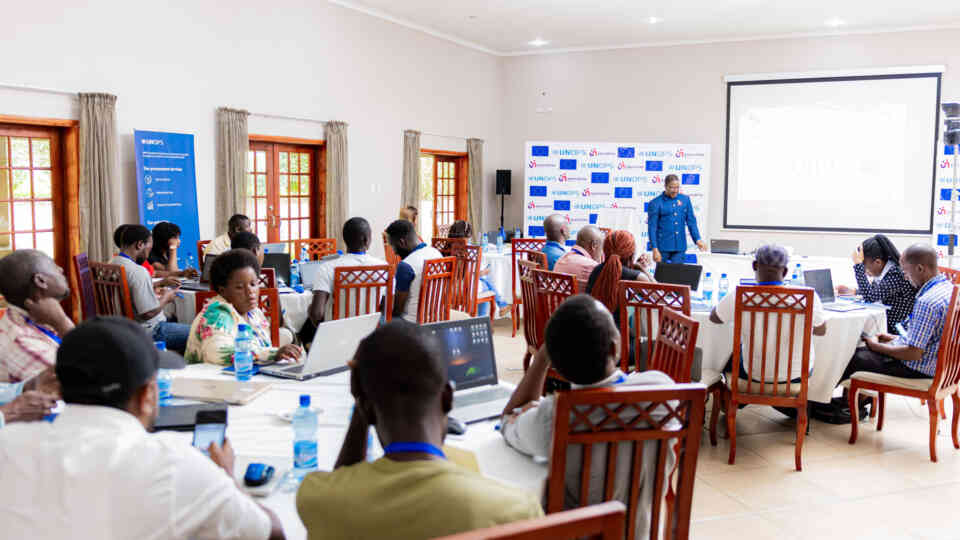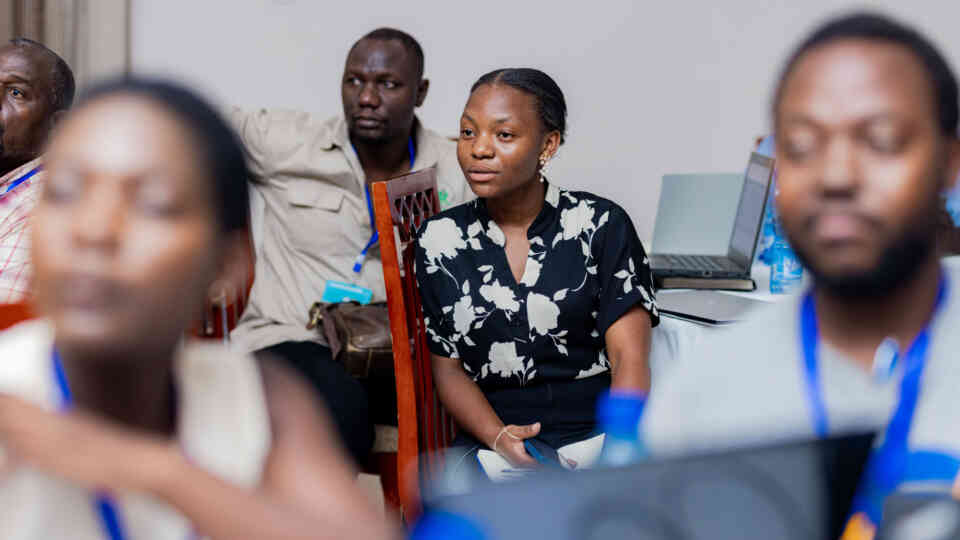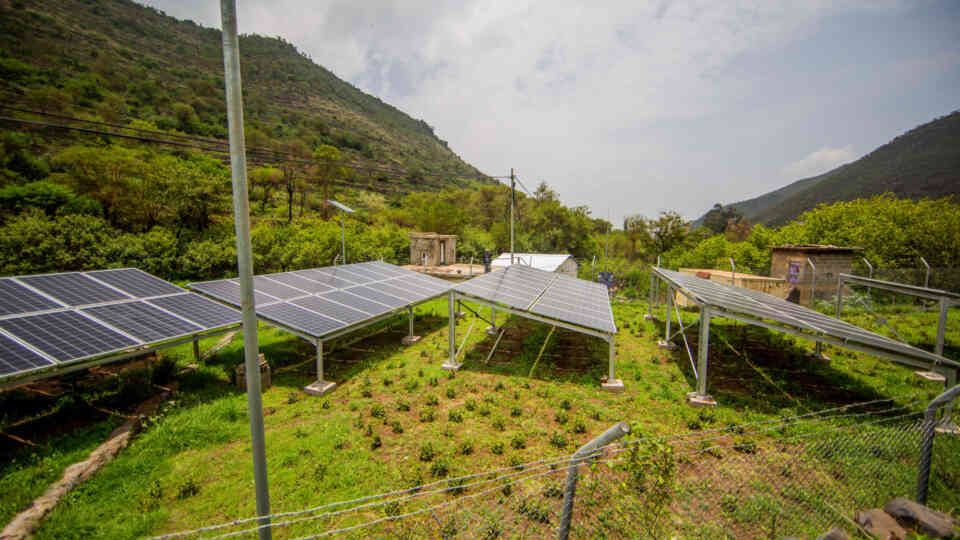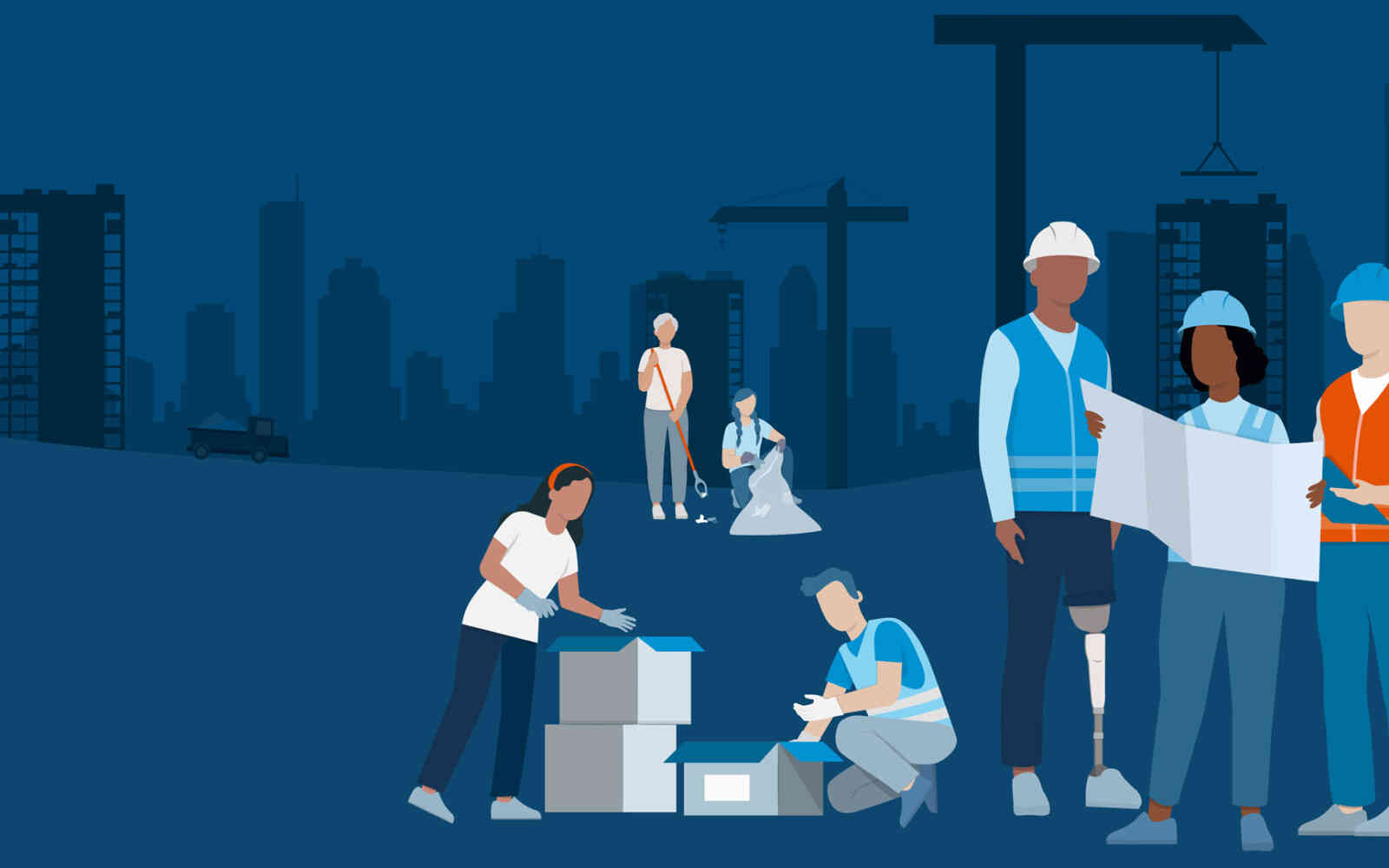The United Nations Office for Project Services (UNOPS)
Supplier Resource Centre
As a valued current or potential UNOPS supplier you play a key role in our mission to help people build better lives and communities, and countries achieve peace and sustainable development.
From information and capacity-building resources to current business opportunities, this resource centre is the one-stop shop for all suppliers who want to do business with UNOPS. It is designed to support every step of your supplier journey and to help you build your skills and expand your opportunities.
Our aim at UNOPS is to build long-term partnerships with reputable and ethical suppliers and to deliver impactful projects together. By providing these resources we help to ensure that the suppliers we work with share and reflect the values of the people and communities we serve.
Our procurement
Our procurement
Each year UNOPS procures over $1 billion worth of goods and services on behalf of our partners through our global supplier base of over 6,000 suppliers from over 170 countries. As a supplier, you could be involved in a wide range of UNOPS projects, from providing life-saving pharmaceuticals in Myanmar to building infrastructure in Haiti.
Some of the key areas where your products or services could be needed include:
Healthcare: pharmaceuticals, medical equipment and laboratory supplies
Infrastructure: construction materials, engineering services, and equipment for roads, buildings, and hospitals
Equipment and Materials: demining equipment, energy solutions and other specialized items
Transportation: ambulances, armoured vehicles and other specialized vehicles
Information and Communication Technology: computers, networking equipment and IT services
Operational Support: logistics, consulting and other administrative services
General Supplies and Services: fuel, training and humanitarian aid
How we procure
UNOPS procurement activities are based on managing our funds and the funds trusted to us by our partners with care and responsibility.
UNOPS procures according to the following principles:
Best value for money – getting the best quality for the best price
Fairness, integrity and transparency – being fair, clear, honest and treating everyone equally
Effective competition – making sure all suppliers have had a fair chance to participate
The best interest of UNOPS and its partners – making choices that support the goals of UNOPS and our partners
You can read about how we do business in the UNOPS Procurement Manual, available in English, French and Spanish. It provides useful information for suppliers about the rules and procedures that guide our procurement.
The procurement process
Suppliers can participate in UNOPS procurement opportunities through different solicitation methods. Solicitation methods are the different formats used to invite suppliers to bid:
- Shopping
Used for small purchases (less than $10,000)
A simple process useful for standard items, off-the-shelf goods, simple services
You will be asked to provide price quotes
The lowest-priced, most technically acceptable offer will be selected
- Request for Quotation (RFQ)
Used for smaller purchases ($10,000 or more to less than $250,000)
Ideal for sourcing standard, off-the-shelf goods, services or works
You will need to provide a quotation
The lowest-priced offer that is most technically acceptable will be selected
- Invitation to Bid (ITB)
Used for larger purchases ($250,000 or more)
You will need to submit a bid based on clearly defined requirements
Bids will be evaluated to choose the offer that has the lowest price and meets all the requirements
- Request for Proposal (RFP)
Used for high-value, complex procurement ($250,000 or more)
You will need to submit both a technical and financial proposal
Bids will be evaluated based on both your technical and financial proposals
Bids will be evaluated based on cumulative analysis of technical and final proposals
We might try to identify suitable suppliers before we get to the solicitation phase. In this case, you may be required to respond to one of the following:
Request for Information (RFI)
Expression of Interest (EOI)
Pre-qualification (PQ)
Competition types
Depending on the procurement value, market conditions and other factors, UNOPS uses:
Open competition: This is our standard approach that is open to all suppliers.
Limited competition: This type of competition, used rarely, is accessible only to suppliers short-listed from an earlier process using the EOI or PQ process.
Direct contracting: This is where we source from only one supplier. This is used only in exceptional cases.
Promoting innovation
From time to time, UNOPS may use different approaches to find more creative and innovative solutions. For example, there may be projects that require research and development to be conducted upfront, or there may be a need for products or service solutions that are not yet available on, or in, the market.
In these cases, UNOPS may require:
- Multi-stage solicitation processes: We might have meetings with potential suppliers before we start the bidding process to inform the design of any specifications or requirements.
- Quality-based evaluations: We use different ways to evaluate a bid other than cost, for example by looking at how innovative an idea is.
Key information in UNOPS tender notices documents
When you review a UNOPS tender notice, you'll find important details that will help you to prepare your bid such as:
Deadlines: when to submit your bid and any questions you may have about the tender notice
Requirements: the specific goods, services or works needed, described through technical specifications, Terms of Reference (TOR) or design documents
Evaluation criteria: how your bid will be evaluated, based on the solicitation method and criteria, such as formal and eligibility criteria, qualification criteria, technical criteria and financial criteria
Contract terms: the type of contract, including the terms and conditions, that will be signed with the awarded supplier
Submission format: the format, language and specific information you need to include in your bid, such as the returnable bidding forms/schedules
By clearly understanding this key information, you can confidently prepare a strong and competitive bid.
Types of contracts used by UNOPS
Here are the main types of contracts that you may work with as a supplier engaging with UNOPS:
Purchase order: used for goods and/or simple services
Goods contract: used for goods and any related services
Small services contract: used for simple services valued under $50,000
Professional services contract: used for hiring specialists or experts to do specific jobs such as consulting or legal advice, typically valued above $50,000
Long-term agreement (LTA): an agreement set for 3 to 5 years to source specific goods or services at agreed prices – there is no set minimum or maximum quantity of goods or services that may be sourced
Blanket purchase agreement (BPA): a shorter-term agreement (usually 12 months) used to source the same goods or services, up to a limit of $250,000.
Contract for works: UNOPS uses five different types of contracts, based on the International Federation of Consulting Engineers (FIDIC) standards, when hiring contractors to do construction or engineering work
Understanding UNOPS contracts
When you do business with UNOPS, contracts follow a standard structure that includes:
Instrument of agreement: main contract document
Special or particular conditions of contract: any special or particular condition that applies to the specific contract
General conditions of contract (GCC): covers the general conditions that apply to the contract, including important areas like landmines, child labour, sexual exploitation and the rights of workers
Annexes: include any additional contract details such as technical specifications, design documents, terms of reference (TOR) statement of work (SOW), etc.
Become a supplier
Become a supplier
See what we’re planning to procure:
Review the UNOPS Procurement Plans dashboard to identify upcoming business opportunities for your organization to consider bidding on.
Learn about what goods and services we’ve procured in the past:
Get insights about what UNOPS has procured in the past by looking at the Annual Statistical Report on United Nations Procurement (ASR) made available on the UN Global Marketplace (UNGM).
Understand UNOPS and other UN organizations’ procurement trends on our interactive dashboards.
Find out what we’re currently procuring:
- Follow our guide to becoming a supplier and view all open tender notices on the UNGM.
- You can also choose to subscribe to the UNGM Tender Alert Service for a fee to get notifications about tenders from UNOPS and other organizations that match your service or product offerings.
Our supplier programmes
Our supplier programmes
Build your capacity
News
Build your capacity
Post-bidding
Post-bidding
Ask for feedback
UNOPS will provide a debrief to unsuccessful bidders if UNOPS receives a written request from the unsuccessful bidder. The bidder has to submit the request within 10 calendar days of being notified that their bid was unsuccessful.
The UNOPS office that ran the procurement process provides the debrief. The scope of the debriefing is to identify the technical deficiencies or weaknesses of the bidder’s proposal. Debriefings do not discuss the following:
Trade secrets or other proprietary information, including the methodology or approach of other vendors
Financial or cost information about other vendors
Evaluation scoring or the ranking of the vendors
Other vendors’ details
Requesting a debrief is a prerequisite for a bidder to file a bid protest.









